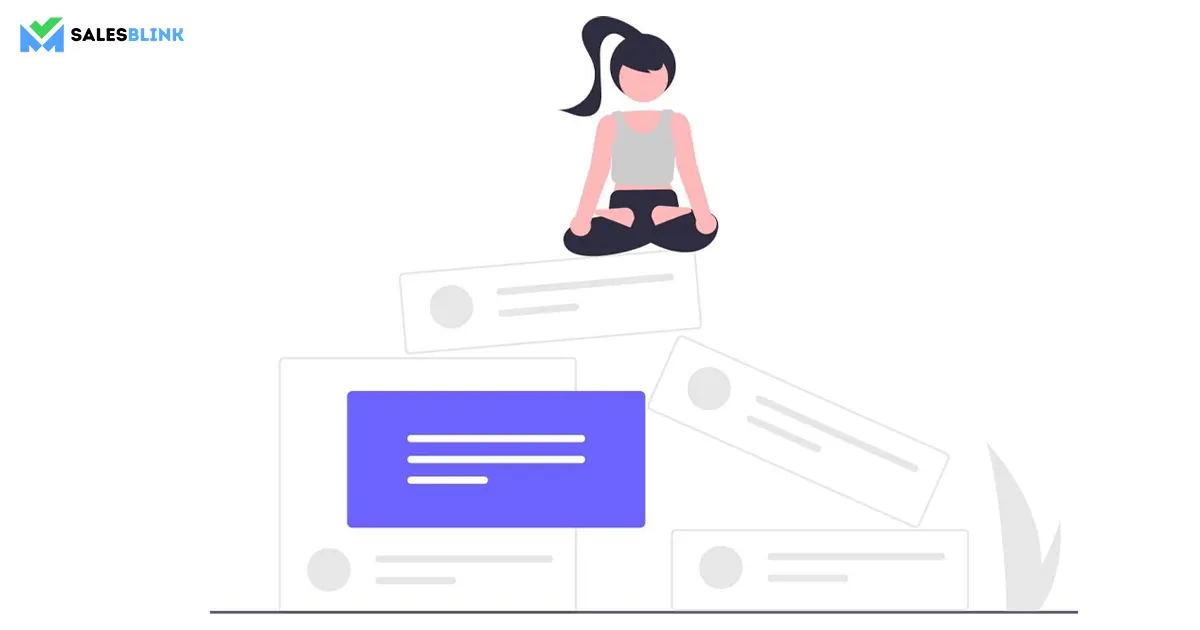10 Effective Ways To Overcome Sales Objection
Are you a sales rep who has is not well-versed in overcoming sales objections? It can affect your ability to close deals. Needless to say, objections are like roadblocks on the journey to success, but don’t worry, you can easily learn to overcome sales objection from the prospect.
In this blog post, we will discuss 10 effective ways to deal with them and convert those hesitant prospects into satisfied customers.
So, buckle up and get ready to learn proven strategies that will not only help you handle objections with ease but also empower you to become a more confident and successful salesperson.
Let’s get started on this exciting journey and find out how to deal with objections in sales closely.
Table of Contents
- What is Sales Objection?
- Why is Sales Objection Handling Important?
- The Process to Overcome a Sales Objection
- Signs That a Prospect Won’t Buy
- Ways to Improve Objection Handling Skills
- Qualities That You Should Develop to Overcome Sales Objections
- Common Types of Sales Objection and How to Handle Them?
- How to Respond to the Sales Objection Made by the Prospect?
- FAQs
What Is Sales Objection?
A sales objection refers to an indication from the buyer that there is a barrier between the product or service you are offering and the need they want to satisfy.
In other words, a sales objection indicates that a prospect is not ready to purchase your product or service due to a specific reason. It would take some convincing from your end to turn prospects into paying customers. Most often, the objections are related to the cost of the product service, the product fitting the needs, and the competition.
When a prospect expresses concern and you as a salesperson try to address it so that the deal moves forward, it is called objection handling. You have to handle prospects in such a way that changes their mind or removes their concerns. Few salespeople try to argue with prospects or force them in the name of objection handling. It is not the right thing to do as you can lose the prospect. Avoid telling the prospect that they are wrong. You can instead approach them in a way that they change their perspective.
Why Is Sales Objection Handling Important?
It is great to move closer to closing a deal, but there can be bumps in the form of objections in the final stage. But before thinking about how to overcome the sales objection of clients? You should know the importance of objection handling.
First of all, it is essential to stop seeing a sales objection in a negative light. It can be beneficial to have objections. Objection handling may be the most underrated step in the sales process, but it is crucial. The success of the deal depends on how well you handle the objection. If you do it well, you close the deal and, if you don’t, you lose it. Therefore, being a pro in the art of objection handling can make salespeople close more deals successfully.
The Process To Overcome A Sales Objection
There are 4 basic steps to overcome sales objection,

1. Listen
As a salesperson, you should actively listen to what the prospect is saying. By doing so, you can be prepared for possible objections even before they come up. Try not to interrupt the prospect when they talk to you about their concerns; give them the time to speak. By being an active listener, the prospect would feel you are genuinely interested and have good intentions for them. This feeling can bloom into the willingness to purchase your product or service after you handle the objections.
2. Understand
Understanding your prospect is immensely important. However, it is not easy as people often don’t say what they mean, and there is always a chance of misinterpretation. Therefore, it is essential to summarize what the prospect says and repeat it to show that you understand their concerns. It also gives prospects a chance to correct what they have understood wrong. The prospects may also have more objections that they didn’t mention. It is your job to ask open-ended questions and give the prospects a nudge to reveal their other concerns regarding your product or service.
We hope you also understand the basics of time management for sales reps.
3. Respond
Even if the prospect objections seem too trivial to you, you have to treat them as valid concerns. Avoid making the prospect feel that you are not serious about their objections because you will never be able to close the deal with them. If you can’t handle the objection yourself, please do so if you only want to lose the customer. However, if you need your senior’s permission, you can request more time from the prospect and get back to the prospect after fixing things.
4. Confirm
Mention the sales objection once again and ask the prospects whether they would take the deal forward if you help overcome the objection. Getting confirmation from them is essential because when you invest time and effort to overcome an objection, you would at least expect to move towards closing a sale. If the prospect doesn’t intend to purchase, it is not an object but a brush-off.
If you ever feel low as a sales professional, read sales motivational quotes.
Signs That A Prospect Won’t Buy
1. They don’t have the budget to buy.
2. Are not qualified leads.
3. Don’t have the decision-making authority.
4. Are not escalating your pitch to higher authorities
It is better to recognize them and stop pursuing the prospect.
Ways To Improve Objection Handling Skills
Here’s how to handle objections in sales calls,
1. Make a note of the typical sales objections you come across while meeting prospects.
2. Devise a plan to overcome the objections.
3. Get a closer look at the opportunities you lost previously and shortlist them.
4. Find out why you could not overcome the object previously and how you have to handle it the next time.
5. Create a script that any of your sales team can use to overcome objections consistently.
Qualities That You Should Develop To Overcome Sales Objections
While overcoming objections in sales, some qualities will help you be successful. You should consider developing them if you want to close more deals.
1. Staying calm

When you are handling an objection, it is better to stay calm. A study says that those who are calm can close more deals.
You have to ensure that you listen well to the objection of the prospect. Instead of convincing the prospect about your product or service in an excited tone, choose to stay composed and have a pleasant expression. Avoid interrupting your customer and forcing information onto them when they are still speaking. While you overcome sales objections, this quality will set you apart from the rest and can be your secret behind closing more deals. If you are wondering how to develop this quality, try making cold calls to your team members to build confidence. Make it sound like an actual interaction with prospects to bring the real feel.
2. Building sales stamina

It would help if you had sales stamina to successfully close sales. That involves being able to stay calm and empathetic when the prospect is getting difficult to handle. As a team, you and other sales reps can present ideas to sell solutions and then look at those that made them close the most important deals and try to see what you can try the next time you meet a prospect.
3. Giving feedback

While you overcome sales objections, feedback is essential for the upkeep of your selling standards. Devising a plan to handle objections is not enough; you also have to make sure you execute it properly. If you are heading the team, you can ask your team members to open up about what objections they had to face the last time they had a conversation with prospects and ask them to rehearse the outcomes with you. Give them feedback and add new objections, if any, to your list.
Common Types Of Sales Objections And How To Handle Them
Here’s a list of the most common types of sales objections you may face as a sales rep. Also, learn how to overcome sales objections,

1. Not needing your solution
In this situation, the prospective buyer doesn’t need to find a solution for a problem they face or are not aware that they have a problem. The product or service you offer doesn’t seem to click with them.
This is how you can discover the customer’s needs,
1. Focus on the result instead of the process – The buyers are more interested in knowing the result than the process. Therefore, keep your focus on how you can add value.
2. Research the prospect’s business – Gather all the information possible about the prospect’s business. Doing so will help you know what they are looking for and which areas you can help them.
3. Avoid rushing into things – After your research is complete, don’t be in a hurry, even if you have discovered a lot about the prospect. Talk to them and ask them questions to get more detailed information. It is always better to go to the root cause of every need.
4. Consider multiple possibilities – When you ask questions to yourself and carry out diversified research, you will discover the clients’ needs and find various possibilities to satisfy those needs.
2. There is no urgency
Another objection is the absence of urgency. Here, the buyers don’t seem to realize the value of your offering. If prospects don’t feel that implementing your solution is urgent, it means you have not demonstrated how valuable your product or service is.
How to make the prospects realize your value?
1. Concentrate on their pain points
You have to find out the buyer’s pain points and tell them how your solution can help ease their pain.
2. Demonstrate the benefit
After identifying the pain points, you have to discuss the benefits and rewards your solution will give to prospects.
3. Discuss in figures
In B2B sales, you have to mention the benefits of your solution in numbers. The ROI and profit margins matter a lot in influencing prospects. To make sure you’ve got the numbers right, use a profit margin calculator.
3. Not trusting the seller
When buyers don’t trust you, they are not sure about you and your solution. They may have a need and may want to satisfy it, but they don’t believe you and your company. Here’s how you can win the trust of potential buyers,
1. Be genuine and helpful
Prospects don’t like salespeople who try to push their product or service towards them. You have to be genuinely interested in the prospect and help them find a solution for the challenges they face. For that, you have to concentrate on building a relationship with prospects by asking questions and showing interest in them. Present your product or service openly to them.
2. Place the focus on the prospect
While discussing your offer, make sure that it isn’t a monologue about your product or service. You have to shift focus from the deal for a while and talk to the prospect in a free-wheeling manner about your other client, the latest occurrences around you, or the stock market. It would encourage the prospect to open up and be a part of the conversation.
4. Having a tight budget
A tight budget is the most common objection you will hear from prospects, but it is also a widely used excuse for other objections. Therefore, you have to get to the root of the problem. You can choose to avoid this objection in the first place by ensuring that you qualify the leads correctly. If the objection seems genuine to you and the prospect cannot afford your product or service, it is better to stop pursuing them. You may still give them an insight into your solution and politely tell them that you will get in touch with them later on. Mark the prospects as a cold lead and keep them aside in your CRM
On the other hand, as mentioned already, some prospects can afford your product but use the budget objection to hide their actual objection. The truth can probably be that your product didn’t convince them. To combat that, you have to demonstrate the value of your product to them.
In most cases, it is possible to handle money objections better and probably close a deal,
1. Break the cost of the product or service into smaller portions. You can mention the cost of the product per week or hour so that the prospect doesn’t feel that it is too costly.
2. Clarify that the value offered by your solution is worth the money you invest in it.
3. Keep the offer flexible and offer only those parts of the solution that the prospect needs. When you remove the parts not required, the cost would automatically come down.
5. Having a product-related objection
There can be objections related to your product. For instance, the prospect may say things like, “Your product is not at par with that of your competitor” or “It is too complex for us.” There can be instances when the prospects don’t understand the features of your product and how it functions. During such instances, your job is to overcome the sales objection and to help them understand the functioning of your product in detail with a demo if possible. Use social proof like customer testimonials to build trust and bring up 3rd party research to your support.
6. Not having authority
Another common sales objection is the person you are dealing with doesn’t have authority. They may not be a decision-maker and would say, “I do not have the authority to sanction the purchase.” To close the deal, you will have to talk to someone who has the authority to make a purchase. So, gather complete information about the decision-maker such as the department they work in, when they are available, whether they are answerable to a higher authority, etc. Be prepared on how to overcome sales objection before you meet them to present your sales pitch. The sales meeting will help transition to the decision-maker, moving closer to your goal.
7. Not willing to do business with seller
This is a rare objection but is one of the possibilities. There are chances of some prospects not being willing to do business with you or your company. It can be because of the standard or reputation of your company. In such a scenario, you can overcome sales objection by being vocal about the strengths of your company. Let the prospect know how long you have been in business, who your clients are, and how satisfied they are with your product. The bottom line is that you have to convince your customer to have faith in you.
8. Being satisfied with the current solution
You may hear potential clients say that they are satisfied with their current solution and may not require your product or service. You may hear something like – “We are working with {{competitor_name}}.”
While it may be disappointing initially, you still have a chance if you refuse to quit. Find what makes the prospect like their current solution so much and find out what shortcomings they find in it. Look for gaps and reveal those to the prospect and show them how your product or service can fill in those gaps. It will help them understand that your solution is better than their existing one, and they are highly likely to make a switch.
If they say – “We have a contract with the competitor,” you can still find a way out because it is likely that the prospect is stuck with the particular vendor and wants to break free. Try helping them by offering a special discount on your product or service so that they don’t get affected by the cost of breaking the contract prematurely. If you cannot give a discount, show that the ROI is much higher with your product, which will recover the amount they lost in breaking the contract.
If the prospect says – “I can find a more reasonable version of your product elsewhere,” there can be two intentions. Either the prospect wants to get more discounts from you, or they feel that they can get their work done with a cheaper product. If it is the first case, you should offer your best discount and highlight your product’s features. However, don’t let the prospect take advantage of you. If they sound too unreasonable, choose to walk away. In the second case, where they compare a cheaper alternative, bring up the difference and stress your solution’s value.
9. Not having time to discuss
One common objection made by prospects is the lack of time to discuss your product or service features.
They may ask to get back to them later on and say, “Get in touch with me in a couple of months.”
You can overcome this objection by telling them that you genuinely value their time and would not take too much of it. Convince prospects that your solution is worth their time.
Make them feel as though they will regret missing this chance. The best way to overcome the objection is by creating a sense of urgency by offering a time-limited deal. It will counter their ‘call me later’ line.
However, make sure that you are not disturbing the prospect if they are stuck with a business problem. If it is not the right time to talk about your offering, choose to call the customer back at a better time.
10. Prospect being aggressive
While you overcome sales objections, this will be a roadblock that you have to face as it is part of your job. Don’t take unpleasantness to heart, and try to stay as calm as you can. Your harsh response will only create an unnecessary issue. You may end the conversation and choose to leave if it doesn’t seem to work out. Remember that the chances of closing the deal are low when the other person is not willing to talk to you.
How To Respond To The Objections Made By Prospects?
You have seen the common sales objections above. Here is how the prospect would word them and how you should overcome sales objection by responding to them tactfully,
Objection 1

Your solution is too expensive
Rebuttal: I would love to showcase the features of our solution and how it can resolve {{pain point}}
Objection 2

We don’t have money
Rebuttal: I understand. Let me tell you about the other solutions we have that might meet your requirements and budget.
Objection 3

There is no remaining budget
Rebuttal: Can I follow up after you get your funds? When should I get back to you?
Objection 4

I have to use this budget elsewhere
Rebuttal: Our previous client had a similar problem, but once they purchased our product, they got a high ROI and could fund other requirements.
Objection 5

I don’t want a contract to bind me
Rebuttal: I understand. We can discuss different contracts and payment terms and see whether they are suitable for you.
Objection 6

There are ongoing talks with another vendor
Rebuttal: Can I know why you chose that vendor? Is it going well with them? Allow me to show you that our product is different from theirs.
Objection 7

I am in a contract with a competitor
Rebuttal: Is your relationship with the vendor good? I can offer you a special discount to compensate for the amount you pay to break the contract.
Objection 8

I am satisfied with your competitor
Rebuttal: Great! Can I know what makes you feel satisfied with them? I would love to see how we compare with them.
Objection 9

I do not have the authority to sanction this purchase
Rebuttal: Can you please redirect me to the right person then?
Objection 10

Our company is getting downsized
Rebuttal: Thanks for your time. It was a pleasure talking to you about {{product_name}}. If you ever need us in the future, please get in touch with me.
Objection 11

I have not heard of your firm.
Rebuttal: We create B2B software for small to medium-sized businesses. It would be a pleasure to speak with you about your requirements and how we can help.
Objection 12

{{Pain point}} is not currently important.
Rebuttal: Can you please tell me more about it? What is presently on your priority list.
Objection 13

I have heard negative comments about your company
Rebuttal: Thank you for sharing this with me. I will let my concerned team know about this. While we are connected, can I provide you with a few tips on improving your sales revenue?
Objection 14

Your product is complex
Rebuttal: Can you please let me know which of the features are confusing you? Our support team works 24×7 to resolve any issue you may have.
Objection 15

Your solution lacks {{feature_name}}, and we want it
Rebuttal: Have you taken a look at {{product_name}}. It complements our product well and will help resolve your issue.
Objection 16

Your solution is not compatible with our existing system
Rebuttal: What tools are you currently using, and what are those products helping you achieve?
Objection 17

I am busy at the moment
Rebuttal: I won’t take too much time. Can we quickly discuss your issues with {{pain point}} and showcase how your product can be helpful?
Objection 18

How did you get my information?
Rebuttal: I found it on your website, and I feel that {{product name}} would meet your needs.
Objection 19

Get back to me next quarter
Rebuttal: I will surely get back to you by next quarter, but before ending this call, I would love to know how your next quarter will be.
Objection 20

I can’t see any benefit in ROI
Rebuttal: It would be my pleasure to show that to you. Can we schedule a call to discuss the potential of our product in detail any time this week?
Time To Overcome Sales Objection Effectively!
overcoming sales objections is an essential skill for any sales professional. By mastering these 10 effective ways to address objections, you will not only be able to navigate through the challenges of the sales process but also enhance your ability to close deals successfully. Remember to listen actively, empathize with your prospects, and tailor your responses to their unique needs and concerns. As you develop and refine your skills in handling objections, you’ll find yourself becoming more confident, adaptable, and effective in your sales career.
Stay persistent and never stop learning, because every objection is an opportunity to grow and improve. Keep practicing and applying these strategies in your day-to-day interactions, and you’ll soon see a positive impact on your sales performance. So, go forth and conquer the world of sales, armed with the knowledge and tools to overcome any objection that comes your way. Happy selling!
You now know how to handle sales objections.
FAQs
A sales objection refers to an indication from the buyer that there is a barrier between the product or service you are offering and the need they want to satisfy.
The success of the deal depends on how well you handle the objection. If you do it well, you close the deal, and if you don’t, you lose it. Therefore, being a pro at objection handling can make you close more deals.
The process of overcoming sales objections has 4 basic steps, listen, understand, respond and confirm. Remember that an objection is not the end of the road in the sales process.







